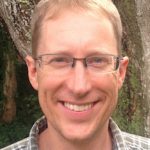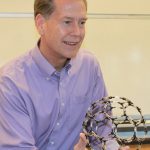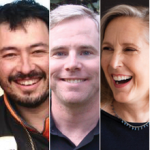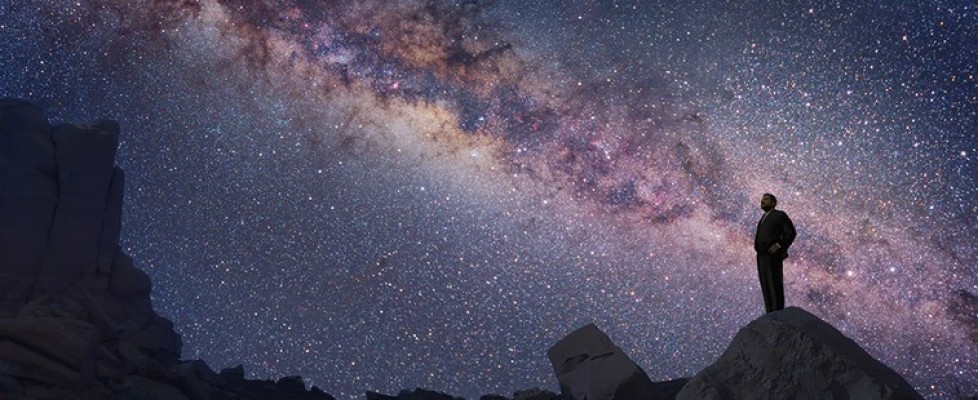Earth in Human Hands – Dec 12

Dr. David Grinspoon
Map: [https://goo.gl/maps/idxqw5gfutz]

Quantum Entanglement – Dec 8

Dr. Ken Wharton

Bad Physics – Nov 14
- The Earth moves through space.
- "Now" has universal meaning.
- The "Old One" does not play dice with the universe.

Tucker Hiatt
Map: [https://goo.gl/maps/Vb9UUufS3F22]

The Science of Deception
- Dr. Luigi Anzivino, neuroscientist
- Marc "Zeke" Kossover, physicist
- Robert Strong, master magician
Map: [https://goo.gl/maps/aQyzY2wrR6C2]

EXPLORING MARS
Sooner or later, humans will walk on the Red Planet. NASA scientist Pascal Lee and The Martian author Andy Weir want it to be “sooner,” and they have deep insights—both technical and psychological—about how to make it happen. Join Lee and Weir in conversation with science writer Mary Roach (Packing for Mars) for a spirited conversation on the promise and peril of humanity’s first in-person exploration of an alien planet.
Dr. Pascal Lee is the author of Mission: Mars. He is also co-founder of the Mars Institute, planetary scientist at the SETI Institute, and principal investigator for NASA's Haughton-Mars Project. Andy Weir is the author of The Martian. He is working on a new "hard sci-fi" novel (where everything is accurate to real-world physics) set in a city on the Moon. It's about a woman who, as a low-level criminal, gets in way over her head (... and high above ours).

Pascal Lee, Andy Weir, Mary Roach
Map: [https://goo.gl/maps/AEUBk5tcokP2]
Produced in collaboration with the Commonwealth Club Silicon Valley.

An Evening with Larry Brilliant, Oct 10
Produced in collaboration with the Commonwealth Club Silicon Valley. Purchase discount tickets through THIS LINK with promo code WONDERFEST.

Wonderfest’s “ORIGINS NightLife” at the California Academy of Sciences, May12
TICKETS: Get general NightLife info, and purchase tickets here.7:00pm – Eliot Quataert (Director, UC Berkeley Theoretical Astrophysics Center) on "How the Universe Evolved from Smooth to Lumpy" — The infant universe was remarkably uniform, with only tiny differences in its properties from one part to another. By contrast, the present universe exhibits enormous differences: some regions host planets, stars, and galaxies (and even humans!) while others do not. Prof. Quataert will describe how the universe evolved from its smooth beginnings to its current state, emphasizing how gravity reigns supreme and builds up the planets, stars, and galaxies required for biological evolution to proceed.
8:00pm – Dave Deamer (Professor of Biomolecular Engineering, UC Santa Cruz) on "Salty Sea or Darwin's Pond: Where Did Life Begin?" — Many undersea hydrothermal vents are loaded with bacteria, so scientists propose that life could have begun in similar sites four billion years ago. But science works best when there is competition between ideas. Prof. Deamer will describe field studies in the hydrothermal fields of Hawaii, Iceland, Kamchatka, and Mt. Lassen’s Bumpass Hell. He’ll discuss lab simulations that argue in favor of life’s origin in the fresh water environment suggested by Charles Darwin in 1871.
9:00pm – Henry Gilbert (Associate Professor of Anthropology, Cal State East Bay) on "Human Civilization from a Paleoanthropologist's Perspective" — Webster’s defines civilization as “the condition that exists when people have developed effective ways of organizing a society and care about art, science, etc.” Is civilization a useful term in academia? … in geopolitics? Does the term unite or divide humanity? Using numerous visual presentations of artifacts, excavations, and prehistoric societies, Prof. Gilbert will address the archaeological origins of intelligence, art, and other aspects of modern human behavior that may constitute civilization.
- WHAT: Wonderfest's "ORIGINS NightLife" at the Cal Academy
- WHO: Eliot Quataert (UC Berkeley); Dave Deamer (UC Santa Cruz); Henry Gilbert (Cal State East Bay)
- WHEN: 6:00 PM, Thursday, May 12
- WHERE: California Academy of Sciences, 55 Music Concourse Drive, Golden Gate Park, San Francisco
- HOW: Purchase tickets via the Cal Academy.
- WHY: Because we're curious creatures.

